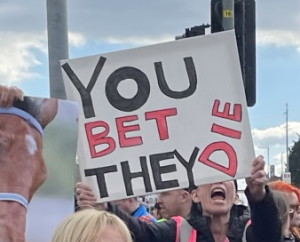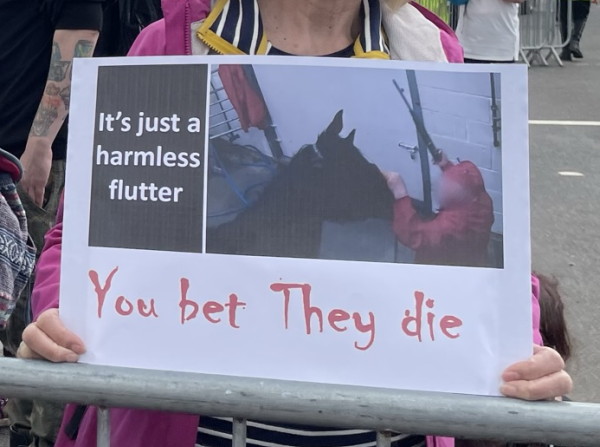Who Are Animal Rising And Why Did They Want To Stop The Grand National?
The Grand National is an event that is always full of spectacle. It’s usually the horses and jockeys themselves that are creating it, though. This year, things were a little different. On Saturday, April 15th, 2023, a group of 300 people from Animal Rising attended. Their mission? To protest the Grand National and other horse races around the world. Spectators blasted the protest, which included an invasion of the Aintree course. As a result, the Grand National ended up postponed by approximately fifteen minutes. Authorities removed the activists from the course in time, with the race proceeding afterwards.
What did Animal Rising hope to achieve from their actions, though? Were they successful in highlighting the issues that they hold dear? We know that fans of the Grand National rushed to social media to voice their complaints. Yet before the race even began, the animal rights group said they would try to stop it. Thus, was policing at its absolute best at the event? Some would likely suggest not. Here, we’re going to look at why Animal Rising took to the course and protested the Grand National.
Who Are ‘Animal Rising’?
 Animal Rising came to life in London back in June of 2019. It had the original name of Animal Rebellion. The group operates as a British animal activist movement. Through it, there is the aim of compelling the government to take action towards animal rights. Animal Rising also pushes a plant-based food system. Around 100 organisers operate within the group.
Animal Rising came to life in London back in June of 2019. It had the original name of Animal Rebellion. The group operates as a British animal activist movement. Through it, there is the aim of compelling the government to take action towards animal rights. Animal Rising also pushes a plant-based food system. Around 100 organisers operate within the group.
The movement uses civil disobedience methods to get its points across. This has resulted in the police arresting various members at different times. Actions by Animal Rising include graffiti, blockading, destruction of property, and more. Activists have even tackled food distribution and trespassed on livestock industry premises. Even so, the official website of the movement states that it is a peaceful, nonviolent group. It became Animal Rising in April of 2023, moving away from the Extinction Rebellion movement. It now focuses in an exclusive way on animal rights issues.
As things stand at the time of writing, Animal Rising makes two demands of the government:
- To support farmers and fishing communities in moving away from animal farming and fishing as part of an urgent transition to a plant-based food system.
 To rewild the freed-up land and ocean as part of a vast programme of wildlife restoration and carbon drawdown.
To rewild the freed-up land and ocean as part of a vast programme of wildlife restoration and carbon drawdown.
Since the start of Animal Rising, it has involved itself in many protests. Its first operation was to organise a wave of civil disobedience in London and Berlin. This saw members protest in front of the UK Department for Environment, Food and Rural Affairs (Defra). The Berlin side of things did the same outside the German Ministry of Food and Agriculture. Various other locations also ended up targeted, such as Billingsgate Fish Market. Several dozen arrests occurred for obstruction of traffic.
Throughout 2020, 2021 and 2022, the story has been much the same. A variety of locations experienced disruption from Animal Rising protests. The last activity taking place before April of this year occurred in November of 2022. This saw Animal Rebellion members join the Just Stop Oil group in a protest on the M25. That same month, they occupied Gordon Ramsay’s 3-star Michelin restaurant in Chelsea.
Why Target The Grand National?
 Not much had been happening on the Animal Rising front for several months. Yet a day or two before the 2023 Grand National, the group said it aimed to disrupt the event. Sure enough, on Saturday, April 15, activists made their move. Around 70,000 people were in attendance to watch as Corach Rambler rode to victory. Yet there is little doubt that the pre-race protests will stand out in everyone’s minds.
Not much had been happening on the Animal Rising front for several months. Yet a day or two before the 2023 Grand National, the group said it aimed to disrupt the event. Sure enough, on Saturday, April 15, activists made their move. Around 70,000 people were in attendance to watch as Corach Rambler rode to victory. Yet there is little doubt that the pre-race protests will stand out in everyone’s minds.
Using ladders to scale the tall metal fences around the course, protestors made attempts to climb up and over. Some managed to make it on to the racecourse and delay its start. However police were prepared and ready to intervene which meant it took only 15 minutes to clear the protestors from the track. Afterwards, the police said that 118 people were under arrest for trying to delay or abort the race entirely. Some of them also had public order offences from before the invasion.
Even so, the group appeared to come close to halting the Grand National. Two members of the extremist group ended up being carried off the course in the midst of using glue and padlocks to aid their protest. Their attempts to attach themselves to the fences of the course were swiftly stopped.
The race began 15 minutes later, yet tragedy was in the air. On a first-fence fall, Hill Sixteen broke its neck and later had to be euthanised. Previous to this race on the same day, Dark Raven also had to be euthanised. A further death had also occurred during the week with Envoye Special also tradgically passing on the Thursday of the event.
Fans of the Aintree event came out of the woodwork to lambast the protestors. Many stated that they were responsible for the death of Hill Sixteen, thanks to the delay. Trainers and jockeys said the horses became stressed with the invasion and delay. Yet Animal Rising said that if this was something they were aware of, why did they allow the race to go ahead?
 Alex Lockwood, a member of Animal Rising, spoke with The Guardian about the decision to protest at Aintree. He defended the group’s actions, with the deaths of horses being something to highlight. Such outcomes, he said, are par for the course with racing events. Lockwood also spoke of the racing authorities and betting industry defending welfare improvements. Yet these are often slow and useless, in the group’s opinion.
Alex Lockwood, a member of Animal Rising, spoke with The Guardian about the decision to protest at Aintree. He defended the group’s actions, with the deaths of horses being something to highlight. Such outcomes, he said, are par for the course with racing events. Lockwood also spoke of the racing authorities and betting industry defending welfare improvements. Yet these are often slow and useless, in the group’s opinion.
Animal Rising states that the Grand National should have entered retirement years ago. It states that it serves as a dangerous institution.
Despite the group’s failure to halt this year’s race, Lockwood says there was success. It brought attention to the fact that this is a bigger problem than only the Grand National. Animal Rising highlighted the broken relationship between animals and the natural world. This, Animal Rising says, is something at the heart of the climate and nature crisis.
Lockwood also noted that the Grand National, and other races, come from outdated beliefs. Those beliefs suggest that it is alright to control animals and use them for profit. The Grand National stands as quite the emblem of this one-sided dominance. It is because of this that Animal Rising tried to stop it from taking place.
Whether you agree with Lockwood and Animal Rising or not, the group has raised some eyebrows. There are various issues that need discussing on animal welfare. Of course, there will always be those who object outright without adequate knowledge. It’s important to look at both sides of an argument in an effective way.
The likelihood is that the UK Government isn’t going to do away with the Grand National. It’s responsible for making a vast amount of money each year. That much is true for horse racing in general. Sports betting brands aren’t likely to back Animal Rising either, for the same reason.

